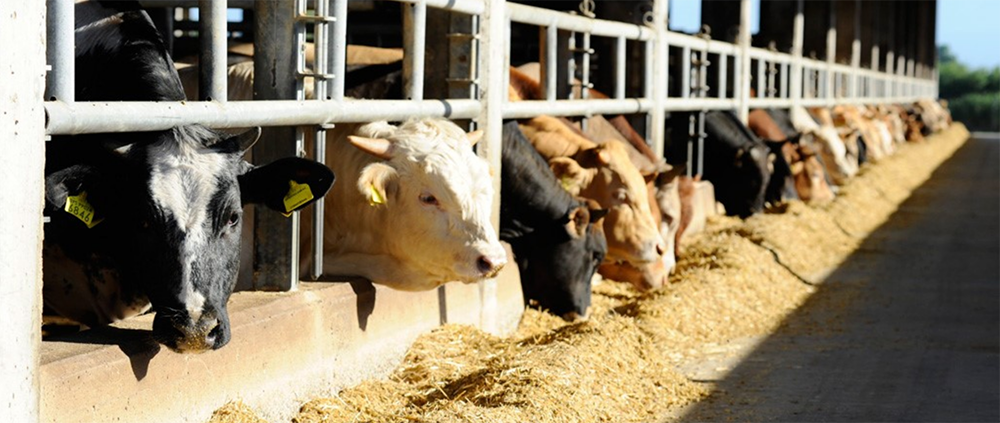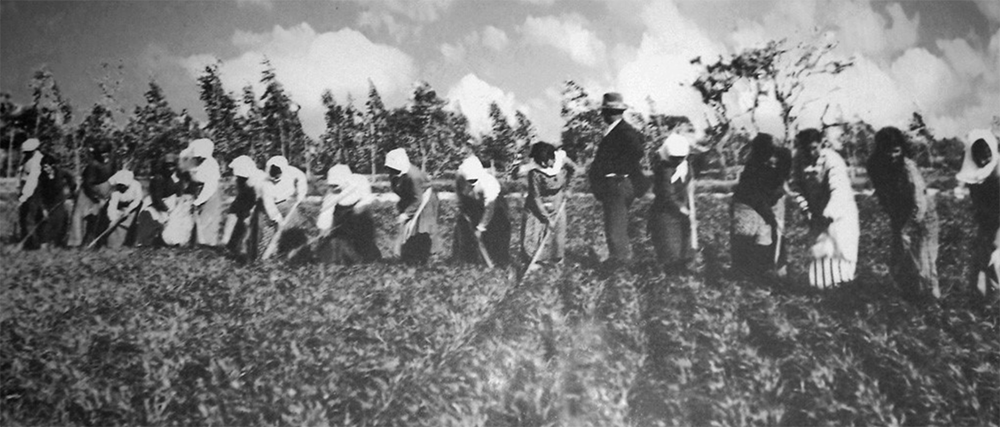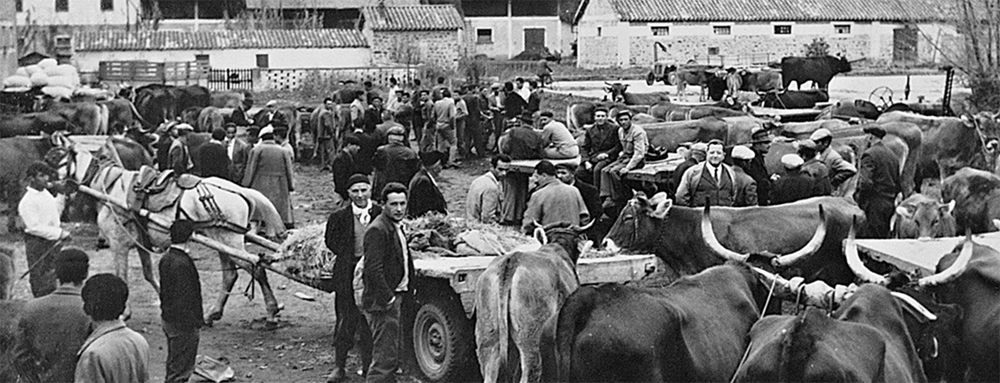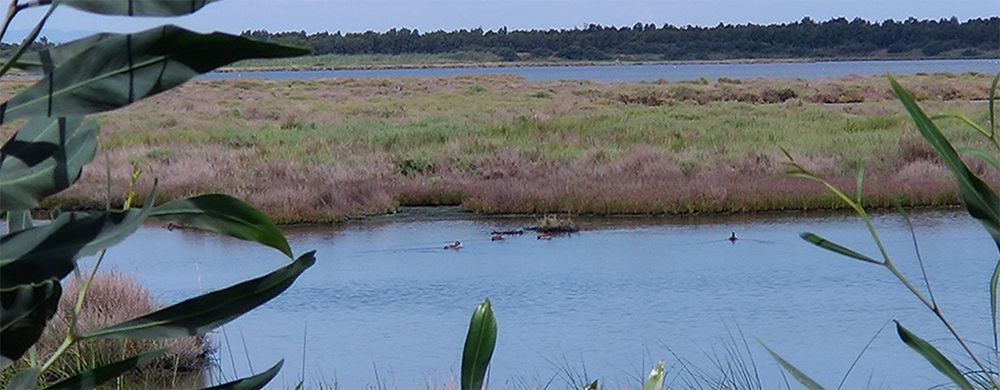"The Segni agrarian reform started off a little late here in Arborea. The Sardinian Reclamation Society (SBS) wouldn’t cede the lands that in the fascist period had allowed it to be celebrated as one of the most productive in the whole nation. The redistribution, they objected, could not concern such an excellence. The sharecroppers rebelled, there was some uproar. Ministers of the new republic came to placate their spirits. It was the Sardinia Region that eventually bought the SBS shares, guaranteeing the purchase to the sharecroppers. Fifty six-monthly installments. The need to keep supply and demand together, to avoid fragmentation, arose. Thus the Arborea Producers Cooperative was born on 1 January 1955. Among the first thirteen signatories was my grandfather and my namesake, Giovanni Sardo”.
The cooperative now lives in the large building built a few steps from Strada 14 Ovest, one of the great arteries crossing the reclamation area. The associates are now over 250, and one hundred of them come from all over Sardinia. An enlargement of the productive community wanted by Giovanni Sardo, positive that parochialism is not useful in the contemporary world. Breeders and farmers benefit from a long list of services: a warehouse with ten thousand items, tax and technical advice. "We do not abandon anyone who is in difficulty. Mutuality is a founding principle of the cooperative" says the president.
"If we imagine the future, we see agriculture as one thing only with environment protection. We are sorry to be often perceived as cynical exploiters of natural resources. Actually we are the first to demand the preservation of the ecosystem that guarantees our wealth. We lay on sandy, voracious soils. Water gets swallowed rapidly. Climate change has been affecting production for twenty years now. We pass from winter to summer with very short intermediate seasons. We are afraid of floods and droughts, so we try to prepare ourselves for the future", explains Sardo.
Thanks to sprinkling and drip irrigation, the use of water resources has been reduced, especially in the horticultural sector. In addition to the energy savings, these allow the plants to get sick with less frequency, causing a drastic decrease in the use of pesticides. Nine years ago, Arborea has been registered as a vulnerable nitrate zone. "We have many nitrates in a limited area. In the first years the results of a more careful management of the waste made us hope for success. Then we witnessed a turnaround. It is clear that someone does not respect the limits imposed by the agronomic utilization plan, for this reason we are working to a protocol that binds everyone", announces the president.
Sardo implies not only new ethical standards, but a concrete monitoring system that the cooperative is developing thanks to the support of Maristanis and the collaboration of the University of Sassari and a software house in Cagliari. "Thanks to the satellite images granted by the European Space Agency we want to create a survey method that can accurately indicate the quantity of water, humidity and biomass present in the fields. We articulate infrared technology with the analyses conducted on the ground” explains Lino Tammaro, the cooperative’s agronomist. The changing map of all the affiliated companies will then become a file in which every member will have to insert all his daily actions: processing, fertilization, disposal of waste, pesticide treatments. A stable register, a country notebook capable of improving efficiency and sustainability.
The cooperative is working on several initiatives focused on sustainability, that the Maristanis project supports in the experiments concerning the methods of abatement of the use of chemical pesticides used near wetlands. Soon, then, a comparative analysis will be carried out on two groups of ten calves each, of which only one fed with spirulina, a cyanobacterium that can improve the animals’ wellbeing and guarantee consumers a healthier product. Or the PRISMA project, which would like to use slaughter waste to obtain, thanks to earthworm colonies, a synthetic peat that is useful as a soil improver or fertilizer. But also, thanks to a study conducted once again with the University of Sassari, to eliminate synthetic products from the fertilization of the island's pastures. "Not because-Tammaro states - it is part of a biological struggle, but in order to offer a sustainable product within the ‘born and bred’ project in Sardinia. We do not think of organic products, but a low impact on the environment that has housed the cooperative for many years, and that we must preserve in future conditions that are announced by every analysis as difficult”.

The Island made of mussels in Corru Mannu's pond began to be populated by birds
Little tern, common tern, sandwich tern, rosy gull and black-winged stilt are some of the bird species that have found a home in Corru Mannu in recent weeks. Thanks to…

Sardinian Wetlands, the best way to protect them is "to manage them"
Cagliari, 04.02.2023 – Le zone umide sono ecosistemi acquatici sempre più rilevanti, conoscerli meglio è il primo passo per tutelarli, ma non è tutto. “Serve uno strumento di gestione” per…

The II D from Terralba Institute visited the Old Tower of Marceddì as prize for Terre d'Acqua school contest 2022
Learning about the role of these precious and very important ecosystems, as well as the specificities of the large wetland area of Oristano. In recent days we have accompanied the…

Maristanis was showcased at the Ramsar COP 14 on wetlands during a side event
The 14th meeting of the Ramsar Wetlands Conference (COP14) was held in Geneva from 5 to 13 November 2022, simultaneously also in Wuhan, China. At the International Conference Center in Geneva (CICG) all…

Learning from the Maristanis's model in the ENSERES's visit exchange
Two days to study an integrated management model of marine-coastal systems, two days to strengthen ties and develop new strategies for a sustainable future of the Mediterranean. The Italian stage…

A step forward for the Maristanis project, towards the Regional Park of wetlands in Sardinia
The Municipal Council of Oristano, on the proposal of the Councilor for the Environment Maria Bonaria Zedda, has launched the participatory process and the preparatory actions necessary for the establishment…

Evaluating ecosystem services by the TESSA Methodology in Arborea
How to understand the effects on natural capitals and actual and potential state changes of individual sites important in promoting decisions to support both biodiversity conservation and ecosystem service provision?

Terre D'Acqua 2022, the winners of the school contest within the Maristanis Project
With 87 works, of which 84 in the drawing category and 3 in the comics category, the MEDSEA Foundation's Terre D’Acqua 2022 Competition ends. The school contest took place from February…

The Sardinian farms met in Arborea under the sign of Sustainability
This is the year of relaunch for the La Fiera dell’agricoltura di Arborea (Agricultural Fair of Arborea), one of the most important thematic fairs in Sardinia that promotes the productive, agro and…

Maristanis in the news: Rai and Italia 1 dedicated ample space to the Maristanis Project
The Italian press gave ample space to the Maristanis project in recent months, the Oristanese wetlands and its most important project Maristanis were told in various national and local television reports on…

The winner of the World Wetlands Day in Sardinia 2022 Contest
With a picture taken in the Oristanese lagoons representing a group of flamingos and the sentence "They come / They come back / Sometimes they stop / Like nomads /…

Over 700 visitors for the World Wetlands Day Calendar
Over 700 visitors in the World Wetlands Day collective calendar, put together by the MEDSEA Foundation, as part of the Maristanis project last February, with the aim of promoting the precious…

The World Wetlands Day 2022 in Sardinia lasts a month, the events Calendar
As every year, the World Wetlands Day on the anniversary of the RAMSAR convention (of 1971, Feb. 2nd) calls and Sardinia, in particular the Oristanese area, replies within the Maristanis project that…

World Wetlands Day in Sardinia, from 2 to 27 February join the competition #WWDSardegna on Instagram
In the occasion of the World Wetlands Day which celebrates ponds and lagoons in the world next February 2, the MEDSEA foundation launches the contest on wetlands in Sardinia with the hashtag #WWDSardegna to…

MAVA Steering Committee in Provence: Sardinia was promoted with the Maristanis project
MEDSEA foundation, which has been carrying out the Maristanis project in the Oristano area in Sardinia since 2017, attended last week the yearly meeting of the MAVA steering committee. The session took place from 16 to 17 December 2021 in Châteauneuf-le-Rouge, in the Provence-Alpes-Côte d'Azur region, and gathered together the…

Terre d'Acqua, a wetlands school competition for students in the Oristanese
On February 2, the World Wetlands Day will be celebrated once again the Oristanese wetlands region. To recall the central role of wetlands in addressing climate and environmental crisis and to raise awareness of the importance of these basins especially in this west coast side…
- 1
- 2
- 3
- 4




